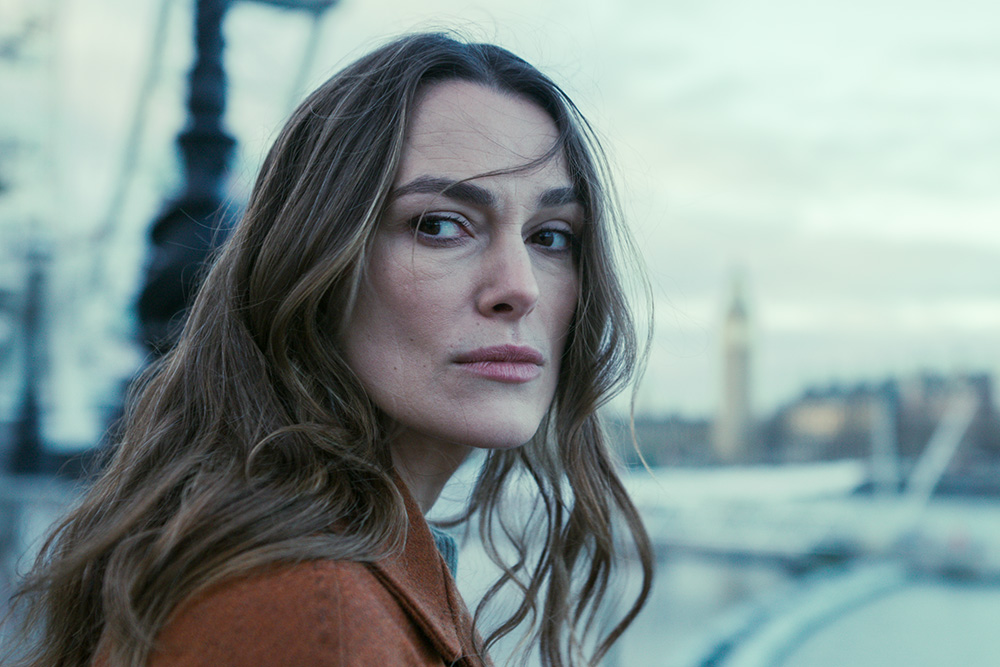
Keira Knightley as Helen Webb in the Netflix series "Black Doves" (Netflix/Ludovic Robert)
Editor's note: This review contains mild spoilers.
There are moments in "Black Doves," the six-episode Netflix thriller series starring Keira Knightley and Ben Whishaw, that feel like any given show about a capitalistic spy organization full of deceit, murder and revenge. But at its core, this is a show about moral code, human connection and spiritual renewal.
"Black Doves" follows Helen Webb (Knightley), the wife of Britain's defence secretary and a loving mother to two children, in her quest to avenge her secret lover's murder. In the first episode, at Helen's swanky annual Christmas party for the British upper class on a snowy night in London, we learn alongside our heartbroken protagonist of the murder of Jason Davies (Andrew Koji).
The bearer of bad news is Mrs. Reed (Sarah Lancashire), a cold yet maternal woman who long ago recruited Helen into the Black Doves, a ruthless organization of women who acquire and sell secrets to the highest bidder, working for no single nation and with loyalty only to themselves. Mrs. Reed manages Helen Webb (birth name Daisy Bradshaw) and her, well, web of secrets.
Alongside longtime friend and triggerman Sam Young (played by Whishaw), Helen uncovers more than just truths about the covert organization she works for as she seeks to avenge Jason's murder; she comes to embody the spiritual symbolism of the show's title itself.
Advertisement
Doves are prevalent in the Christian tradition. In Leviticus and later in Luke, doves are offered in the temple as a sacrifice for purification and atonement. In Genesis, the dove is a harbinger of new life and signals the end of the flood. The dove that descends upon Jesus during his baptism in all four Gospel accounts represents the Holy Spirit, as does its depiction in Christian iconography.
In Hebrew, the word for Spirit is ruach, which is feminine. Interestingly, scientists argue that doves are monogamous and likely mate for life. A black dove, then, could be said to represent mourning, even widowhood.
These connections are noteworthy, since the Black Doves are an exclusively female group and Helen is desperate for salvation. Over and over, the spy organization turns traditional dove associations on their heads: Rebirth? Only if that means putting a new Black Dove in a fallen one's place. Peace? Unlikely. Once you're in, you watch your back forever.
Moreover, the color black can connote wickedness, but so, too, can it point to a journey through darkness and grief. Through Jason's murder, one could say Helen is much like a black dove and a widow in mourning.
As a literature professor and a Catholic, I was struck by the "Black Doves" method of storytelling, specifically the pointed symbolism of the dove and also the way the show creates meaning through the use of flashbacks. We see that technique used in biblical writing as well; for example, the story of the Tower of Babel (Genesis 11), the leadup to the beheading of John the Baptist (Mark 6), and Paul's recollection of his trip to Antioch (Galatians 2).
In both storytelling mediums, characters appear and are developed over the course of the series through windows into their respective pasts.

Ben Whishaw as Sam Young and Keira Knightley as Helen Webb in the Netflix series "Black Doves" (Netflix/Ludovic Robert)
We learn that Knightley's Helen has a dark origin and holds allegiance only to herself and Sam, who himself has a complicated trauma history that primed him to be an assassin, albeit a sensitive one. He longs for peace, and his friendship with Helen is tender.
When we first meet Sam, he appears behind a woman he'd just killed to protect Helen. In the final episode, as he's about to resign himself to a fate of loneliness and isolation, Helen invites him to her home for Christmas dinner and Sam realizes a new kind of hope. He may not be able to leave his life as a "trigger man," but he starts to forgive himself for his considerable sins and begins to seek redemption through human connection.
As one of his fellow assassins learns, "It can't be just business. Not with the cost of it all."
For her part, Helen's character invites us to consider both the white and black doves that live in all of us. It is surely no coincidence that the climax of Helen's storyline comes inside a church during midnight Mass on Christmas Eve; she is on the precipice of a changed inner life.
Though she has no choice but to remain tied to her fellow antiheroines and continue to steal state secrets, Helen is no longer the widow at the end of "Black Doves." She embraces a different idea of peace as she accepts the life she has chosen, leaving room for gentle signs of hope and learning to integrate her grief with the love that surrounds her. Helen finds she can relish in a new kind of mercy: her real and soulful connection with friends like Sam, the ability to protect and nurture her children and finding gratitude for the loving care of her husband.






